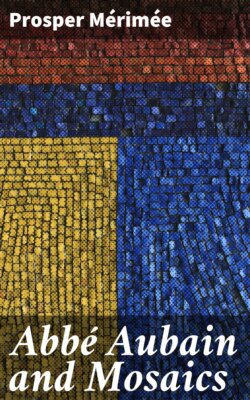Читать книгу Abbé Aubain and Mosaics - Prosper Merimee - Страница 10
На сайте Литреса книга снята с продажи.
LETTER VI.
ОглавлениеTable of Contents
The Abbé Aubain to the Abbé Bruneau. Professor of Theology at Saint-A——.
N——, May, 1845.
My Dear Professor—It is the curé of Sainte-Marie who is writing to you, not any longer the humble, officiating priest of Noirmoutiers. I have left my solitary marshes and behold me a citizen, installed in a fine living, in the best street in N——; curé of a large, well-built church, well kept up, of splendid architecture, depicted in every album in France. The first time that I said Mass before a marble altar, which glittered with gilding, I had to ask myself if I really were myself. But it is true enough, and one of my delights is the hope that at the next vacation you will come and pay me a visit. I shall have a comfortable room to offer you, and a good bed, not to mention some bordeaux, which I call my bordeaux of Noirmoutiers; and I venture to say it is worth your acceptance. But, you ask me, how did you get from Noirmoutiers to Sainte-Marie? You left me at the entrance to the nave, you find me now at the steeple.
O Melibœe deus nobis hæc otia fecit.
Providence, my dear Professor, sent a grand lady from Paris to Noirmoutiers. Misfortunes of a kind we shall never know had temporarily reduced them to an income of 10,000 crowns per annum. She is an agreeable and good woman, unfortunately a bit jaded by frivolous reading, and by association with the dandies of the capital. Bored to death by a husband with whom she has little in common, she did me the honour of becoming interested in me. There were endless presents and continual invitations, then every day some fresh scheme in which I was wanted. "M. l'abbé, I want to learn Latin. … M. l'abbé, I want to be taught botany." Horresco referens, did she not also desire that I should expound theology to her? What would you have, my dear Professor? In fact, to quench such thirst for knowledge would have required all the professors of Saint-A——. Fortunately, such whims never last long: the course of studies rarely lasted beyond the third lesson. When I told her that the Latin for rose was rosa, she exclaimed, "What a well of learning you are, M. l'abbé! How could you allow yourself to be buried at Noirmoutiers?" To tell you the truth, my dear Professor, the good lady, through reading the silly books that are produced nowadays, got all sorts of queer ideas into her head. One day she lent me a book which she had just received from Paris, and which enraptured her. Abélard, by M. de Rémusat. Doubtless you have read it, and admired the learned research made by the author, unfortunately in so wrong a spirit. At first I skipped to the second volume, containing the "Philosophy of Abélard," and, after reading that with the greatest interest, I returned to the first, to the life of the great heresiarch. This, of course, was all Madam had deigned to read. That, my dear Professor, opened my eyes. I realised that there was danger in the society of fine ladies enamoured of learning. This one of Noirmoutiers could give points to Héloïse in the matter of infatuation. This, to me, extremely novel situation was troubling me much, when, suddenly, she said to me, "M. l'abbé, the incumbent of Sainte-Marie is dead, and I want you to have the living. You must." Immediately she drove off in her carriage to see Monseigneur; and, a few days later, I was curé of Sainte-Marie, somewhat ashamed of having obtained the living by favour, but in other respects delighted to be far away from the toils of a lioness of the capital. A lioness, my dear Professor, is the Parisian expression for a woman of fashion.
Ω Ζεῠ, γυναικῶν οἳον ὦπάσὰς γένος.[1]
Ought I to have rejected this good fortune in order to defy the temptation? What nonsense! Did not St. Thomas of Canterbury accept castles from Henry II.? Good-bye, my dear Professor, I look forward to discussing philosophy with you in a few months' time, each of us in a comfortable armchair, before a plump chicken and a bottle of bordeaux, more philosophorum. Vac let me ama.
[1] A line taken, I believe, from the Seven Against Thebes, of Æschylus, "O Jupiter! women! … what a race thou hast given us!" The Abbé Aubain and his Professor, the Abbé Bruneau, are good classical scholars.
